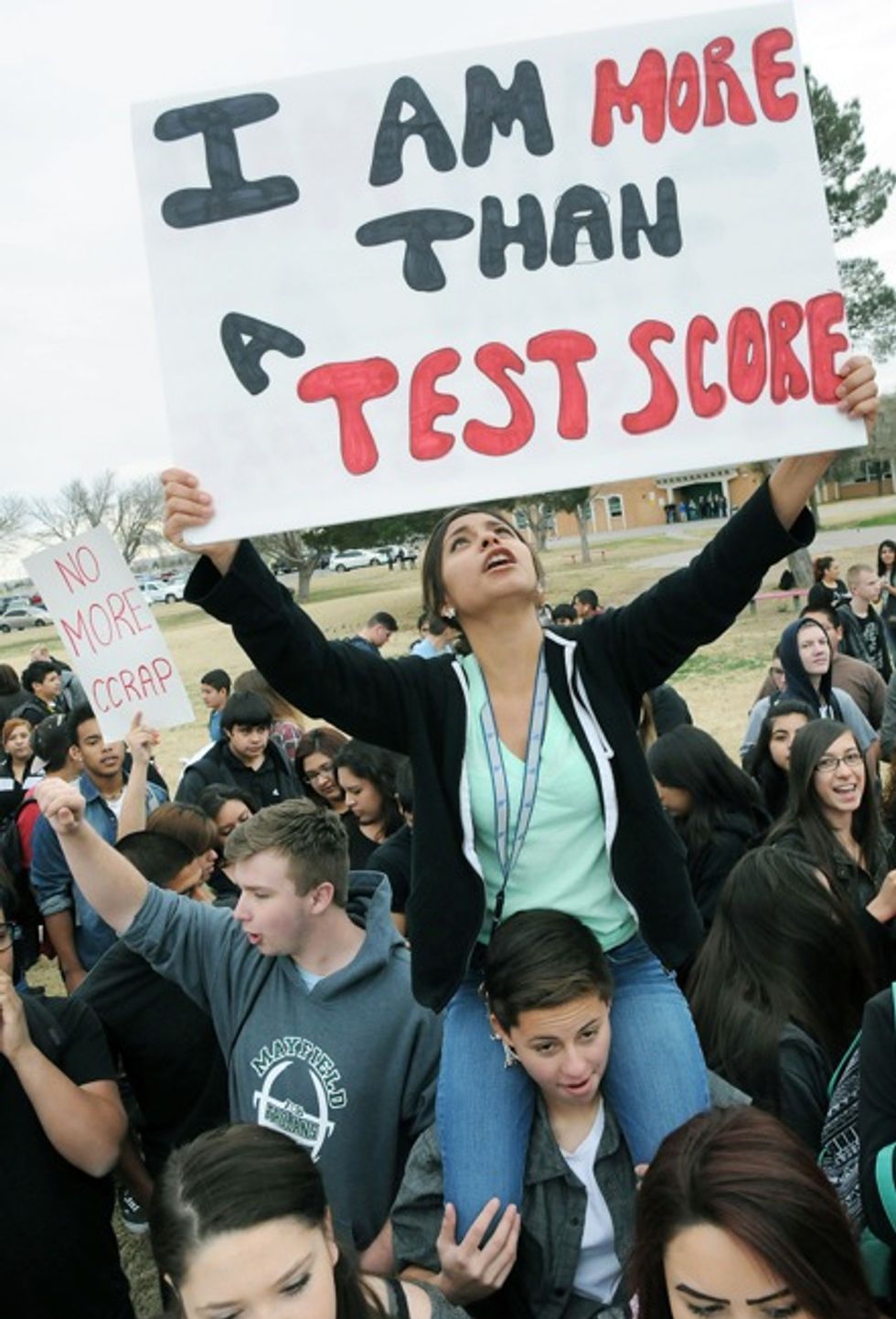ALBUQUERQUE, N.M. (TheBlaze/AP) — Standardized tests based on Common Core standards had a rocky start across the country as tech issues plagued the exam in some areas and prompted student protests in others.
 Teachers from Marion and Alachua Counties protest Common Core and standardized testing outside as former Florida Gov. Jeb Bush, not pictured, spoke on Feb. 10, 2015 at the Keeping the Promise: A Florida Education Summit, sponsored by Bush's Foundation for Florida's Future, at the Florida State University Alumni Center in Tallahassee, Fla. (AP/Phil Sears)
Teachers from Marion and Alachua Counties protest Common Core and standardized testing outside as former Florida Gov. Jeb Bush, not pictured, spoke on Feb. 10, 2015 at the Keeping the Promise: A Florida Education Summit, sponsored by Bush's Foundation for Florida's Future, at the Florida State University Alumni Center in Tallahassee, Fla. (AP/Phil Sears)
In Florida, several school districts decided to stop administering the Florida Standards Assessment test when students had trouble logging on.
Though students have two weeks in which they can complete the 90-minute test, administrators from some of the districts that experienced problems said they did not plan on pushing the test forward at this point:
[...] Miami-Dade Schools Superintendent Alberto Carvalho said he had no plans to resume testing on Tuesday because he had "no confidence" that the problems would be fixed overnight. He said he made the decision because he not heard anything from state officials as to whether the problems had been resolved.
"Press the pause button significantly so to anticipate not just a fix for this issue but all the random glitches," Carvalho said.
Other districts such as Palm Beach County also said Monday night that they did not plan to resume testing either.
Critics of online testing said the problems just reinforced their position that the state was moving too quickly.
"Florida computerized tests are clearly not ready for prime time," said Bob Schaeffer of the National Center for Fair and Open Testing. "The reason is that they were rushed into place based on a Tallahassee-mandated schedule, not technical competence or educational readiness."
Moving west to New Mexico, several hundred students walked out of testing. Students from Albuquerque High School and Highland High School took to the sidewalks with signs and chanted as supporters honked their horns.
Maya Quinones, 18, an Albuquerque High School senior, said administrators warned her that participating in the walkout might prevent her from taking part in graduation ceremonies.
 Mayfield High School junior Laura Cruz, 18, looks up at the sign she is holding on Monday, March, 2, 2015, during a student-organized walkout to protest the PARCC exams in Las Cruces, N.M. Students frustrated over the new standardized test planned school walkouts across New Mexico to protest the requirement. (AP/Las Cruces Sun-News, Robin Zielinski)
Mayfield High School junior Laura Cruz, 18, looks up at the sign she is holding on Monday, March, 2, 2015, during a student-organized walkout to protest the PARCC exams in Las Cruces, N.M. Students frustrated over the new standardized test planned school walkouts across New Mexico to protest the requirement. (AP/Las Cruces Sun-News, Robin Zielinski)
"If we make something happen, if next year comes around and the PARCC test is gone, then I feel like we're successful," said Quinones, an organizer of the protest. "And you know what? As long as I get my diploma, I'm all right. I don't have to walk in line."
Julie Guevara, 16, said students believe the testing is taking away from their overall education.
"We hope the governor hears us and does something about this," Guevara said. "We're not going away and plan to do this again until the testing is done."
 South Valley Academy students protest after leaving class, Monday, March 2, 2015, in Albuquerque, N.M. New assessment tests that have angered parents and teachers across the nation prompted walkouts Monday by hundreds of high school students in New Mexico who had been set to take the exams. (AP/The Albuquerque Journal, Roberto E. Rosales)
South Valley Academy students protest after leaving class, Monday, March 2, 2015, in Albuquerque, N.M. New assessment tests that have angered parents and teachers across the nation prompted walkouts Monday by hundreds of high school students in New Mexico who had been set to take the exams. (AP/The Albuquerque Journal, Roberto E. Rosales)
Gov. Susana Martinez's office did not immediately respond to a message seeking comment.
The test — called the Partnership for Assessment of Readiness for College and Careers, or PARCC, in New Mexico — can also be used in teacher evaluations and school grades.
The walkouts and demonstrations began last week in Santa Fe then continued in Carlsbad on Friday.
Students from several Las Cruces schools joined the movement Monday by walking out of classes. Some carried signs that read "More teaching, less testing," and "Out the door with Common Core."
The Santa Fe walkouts sparked students at Highland High School to stage their own protest, 16-year-old Highland student Connor Guiney said.
"It's an excess of time being used and an unfair evaluation of teachers," Guiney said. "We don't appreciate that and we wanted to make a stand."
Opponents of the exams say they distract from real learning, put added stress on students and staff members, and waste resources, especially in poor districts.
Parents and students in Colorado, Pennsylvania and New York have already opted out of the exams. Others are lobbying lawmakers and education officials for change. In Florida last week, Gov. Rick Scott suspended spring testing for 11th graders.
New Mexico Education Secretary Hanna Skandera said the exams would provide useful results.
"PARCC also takes the necessary step of raising expectations," she wrote in an Albuquerque Journal opinion piece published Sunday.
Skandera said the test isn't an additional exam, just a better version of the state standards exam it replaced.
Some opponents would prefer an exam that samples random students to offer a snapshot without such high stakes attached. Others support rating schools through an accreditation process such as ones used by colleges and universities. Accreditation includes site visits, in-depth analysis and a detailed action plan.
Pennsylvania saw 1,064 students statewide opt out of required math tests last year, a tiny percentage of the 803,000 exams given but a nearly fivefold increase from the number who opted out in 2011, according to that state's Education Department.
In New York, around 5 percent of students — roughly 67,000 — sat out the statewide math test taken by 1.1 million of their peers last year.

 Teachers from Marion and Alachua Counties protest Common Core and standardized testing outside as former Florida Gov. Jeb Bush, not pictured, spoke on Feb. 10, 2015 at the Keeping the Promise: A Florida Education Summit, sponsored by Bush's Foundation for Florida's Future, at the Florida State University Alumni Center in Tallahassee, Fla. (AP/Phil Sears)
Teachers from Marion and Alachua Counties protest Common Core and standardized testing outside as former Florida Gov. Jeb Bush, not pictured, spoke on Feb. 10, 2015 at the Keeping the Promise: A Florida Education Summit, sponsored by Bush's Foundation for Florida's Future, at the Florida State University Alumni Center in Tallahassee, Fla. (AP/Phil Sears)
 Mayfield High School junior Laura Cruz, 18, looks up at the sign she is holding on Monday, March, 2, 2015, during a student-organized walkout to protest the PARCC exams in Las Cruces, N.M. Students frustrated over the new standardized test planned school walkouts across New Mexico to protest the requirement. (AP/Las Cruces Sun-News, Robin Zielinski)
Mayfield High School junior Laura Cruz, 18, looks up at the sign she is holding on Monday, March, 2, 2015, during a student-organized walkout to protest the PARCC exams in Las Cruces, N.M. Students frustrated over the new standardized test planned school walkouts across New Mexico to protest the requirement. (AP/Las Cruces Sun-News, Robin Zielinski)
 South Valley Academy students protest after leaving class, Monday, March 2, 2015, in Albuquerque, N.M. New assessment tests that have angered parents and teachers across the nation prompted walkouts Monday by hundreds of high school students in New Mexico who had been set to take the exams. (AP/The Albuquerque Journal, Roberto E. Rosales)
South Valley Academy students protest after leaving class, Monday, March 2, 2015, in Albuquerque, N.M. New assessment tests that have angered parents and teachers across the nation prompted walkouts Monday by hundreds of high school students in New Mexico who had been set to take the exams. (AP/The Albuquerque Journal, Roberto E. Rosales)





